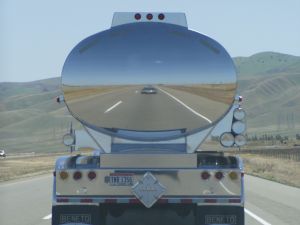Today while running errands I was waiting at a light when a spectacular semi-truck turned in front of me. It had more tires than I’d ever seen on one vehicle, all doubles, 4 to an axle except on the cab. As it drove past, I counted: 36 wheels.
All I could think of was how difficult it must be to keep that many tires in good shape simultaneously. Are they wearing properly and balanced correctly? Are their lug nuts snug? Rotating tires must be a nightmare similar to playing Mancala with game pieces too heavy to lift.
Why so many wheels? The answer is, tons of weight inside.
It made me think of all the excess weight we carry, not in pounds but in burdens. Trouble comes when we try to carry too much on only 2 wheels.
This morning in Bible study we were in Exodus, reading how Moses was trying to lead a million obstreperous people through miserable circumstances. He was doing the best he could, but it wasn’t good enough. He didn’t have enough wheels to hold up his heavy load, and it was ruining him.
God saw the problem and brought Moses’ father-in-law, Jethro, to the massive Israelite camp at exactly the right time. In learning how burdened Moses was he said, “The work is too heavy for you; you cannot handle it alone.” (Exodus 18:18)
So God planted a fresh idea in Jethro’s mind, and Jethro passed it along to Moses. The heavy weight was quickly redistributed to helper-judges, which gave Moses the 36 wheels he needed to continue moving the massive group forward.
Years later he again found himself weighed down by the impossible burden of his role. The people were crushing him with their complaints, so once again he went to God. “I cannot carry all these people by myself; the burden is too heavy for me.” (Numbers 11:14) It was time for a new set of tires. God provided them again in the form of many able helpers, and Moses’ load was lifted.
What about our 21st century loads? More often than not we take on impossible weight, dragging under the heavy burden while trying to give the impression we’re living feather-light. When others see us bent beneath our loads and ask if they can help, we say, ”No thanks,” not wanting to add to their loads. But as we learned in Bible study this morning, if we accept the help of others, a blessing comes to them as well as to us.
Moses modeled what to do when we’re overloaded. Step 1: ask God to lighten it up. Step 2: listen for how. We’re to avoid the extremes of either asking no one, or asking many of the wrong ones, because our best burden-lifter will always be God.
“Praise be to the Lord, to God our Savior, who daily bears our burdens.” (Psalm 68:19)



I’m sure this is a relevant topic for a LOT of people. It’s really hard to say no or to delegate stuff (partly because you have to be organized enough to pass it along). I like your two steps though. They seems “do-able”! Thanks!